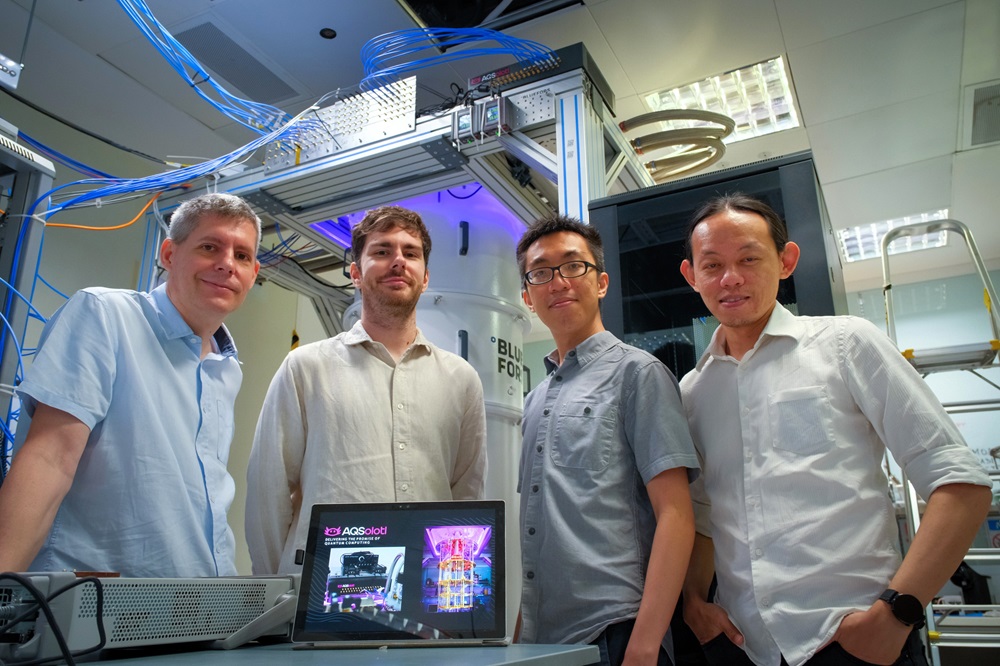Singapore Startup’s Quantum Controller Aimed at Bridging the Gap Between Traditional and Quantum Computing

Insider Brief
- Singapore-based startup AQSolotl, a spin-off from NTU and NUS, has launched CHRONOS-Q, a quantum controller that bridges conventional computers with quantum systems, advancing quantum accessibility.
- CHRONOS-Q simplifies quantum computing operations with real-time feedback, modular scalability, and a compact design, enabling broader use in research labs and industry applications.
- The development reinforces Singapore’s status as a quantum innovation hub and highlights the potential of academic-industry collaboration in driving global technological progress.
- Image: Image: (L-R) NTU Assoc Prof Rainer Dumke with his other co-founders of AQSolotl, Chief Executive Officer Mr Patrick Bore; Head of Quantum Algorithms Mr Paul Tan; and Chief Technical Officer Dr Yap Yung Szen, who is also a Senior Lecturer at the Universiti Teknologi Malaysia. The start-up’s flagship product, Chronos-Q, can be seen at the top right corner of the quantum computer at NTU. (NTU)
A new deep-tech startup from Singapore is working to make quantum computing more accessible and efficient, with potential implications across a range of industries, reports OpenGov Asia.
AQSolotl, a spin-off from Nanyang Technological University (NTU) and the National University of Singapore (NUS), has introduced CHRONOS-Q, a quantum controller designed to connect conventional computers with quantum systems. This development marks a key step forward in Singapore’s growing quantum ecosystem, with applications in areas like artificial intelligence, cryptography, and climate modeling.
A New Era for Quantum Control
Quantum computers operate fundamentally differently from traditional systems by using qubits, which can exist in multiple probabilistic states. Theoretically, quantum systems use that power to process problems that are beyond the reach of even the most advanced classical machines. However, controlling quantum computers has historically been a challenge due to their complexity and resource demands.
CHRONOS-Q addresses this issue by acting as a bridge between traditional computers and quantum systems. It simplifies operations, allowing users to control quantum computers using standard laptops or desktops. According to the team, its intuitive interface lowers the technical barriers for engineers and developers, potentially accelerating adoption across sectors like logistics, materials science and sustainable energy.
Key Features of CHRONOS-Q
The device can determine qubit states in less than 14 nanoseconds, which allows real-time feedback during computations, the news site reports. Its modular design ensures scalability, enabling it to accommodate increasingly powerful quantum computers without significant redesigns. Additionally, its compact form factor makes it suitable for use in research labs, corporate innovation centers, and even mobile quantum computing setups.
The controller’s firmware is both customizable and upgradeable, allowing it to integrate future advancements. These features make CHRONOS-Q a flexible and cost-efficient solution for both academic institutions and industries exploring quantum technologies.
Academic Roots and Industry Support
AQSolotl has its origins in years of collaborative research at NTU and NUS. The intellectual property for CHRONOS-Q has been transferred to the startup, with both universities retaining equity stakes and research rights. These institutions have played a vital role in supporting AQSolotl’s commercialization journey, providing mentorship and fostering connections within the deep-tech ecosystem.
The startup is now seeking funding to integrate artificial intelligence capabilities and develop scalable solutions that lower barriers to quantum adoption for businesses of all sizes.
There are broader implications of the news. Beyond the launch of CHRONOS-Q, the news is evidence of Singapore’s growing position as a global hub for quantum innovation. It also highlights the transformative potential of partnerships between academia and industry in addressing complex technological challenges.
